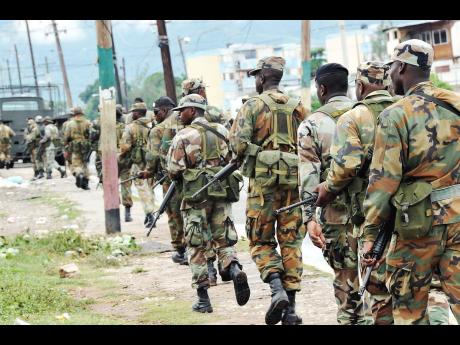BY ANTHONY LEWIS Observer writer —
LITTLE LONDON, Westmoreland — In an effort to steer the country’s most at-risk young men away from a life of crime, legislative changes are being explored to make youth service mandatory.
“It is clear to me that a part of the solution to our problem is that we must be out there, literally, recruiting the young men before the gangs recruit them,” said Prime Minister Andrew Holness, in explaining the rationale behind the initiative.
There is an emergency, he said, within the 16 to 24 age group of Jamaican men, one which the Government is treading carefully, on the legislative front, to address.
“There is one piece of legislation that we have had to think carefully on as to how we bring this in, and it is the new enhanced security measures legislation. That needs to integrate much more in terms of how we treat with our youths in crime because, the truth be told, the perpetrators of crime in Jamaica, by and large, are young men 16-24. And the victims of crime in Jamaica, by and large, are young men 16-24. So, there is an emergency in a particular demographic of our society for which we need to supply new legislative measures to address,” Holness said.

The prime minister was addressing a ground-breaking ceremony for the construction of the Little London Police Station in Westmoreland last Thursday.
Holness, who said more information will be provided at a later date, said the proposed program is aimed at radically changing the trajectory of the country’s youth.
“We had started our national service corps under the JDF (Jamaica Defense Force). It was impacted under COVID-19 but we are going to expand this and we are going to create, genuinely and truly now, a national compulsory service program. Because we will not be able to make a quick and radical change in the trajectory of youth-generated crime, crime generated by young people, without getting our youngsters into a proper program of socialization,” he said.

The prime minister noted that in other countries that are facing challenges, laws and strategies are used to bring young people into a consolidated program such as national service or national military service as it is called in some locations.
“In as much as the crime is driven by economic consideration, the truth is, it is more driven by social considerations — how they have been socialized and how they have been cultured — that is the real issue,” Holness said.
“We are not going to change the trajectory of the society without taking this kind of action to radically shake up the system to bring those young men, in particular, who went to school and achieved nothing [and] will never achieve anything in their lives other than to brag about notches on their pistols and the number of children they have but didn’t father,” he added.


You must log in to post a comment.